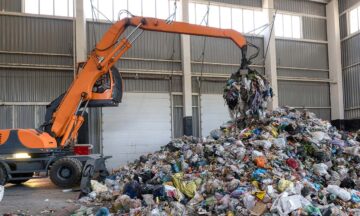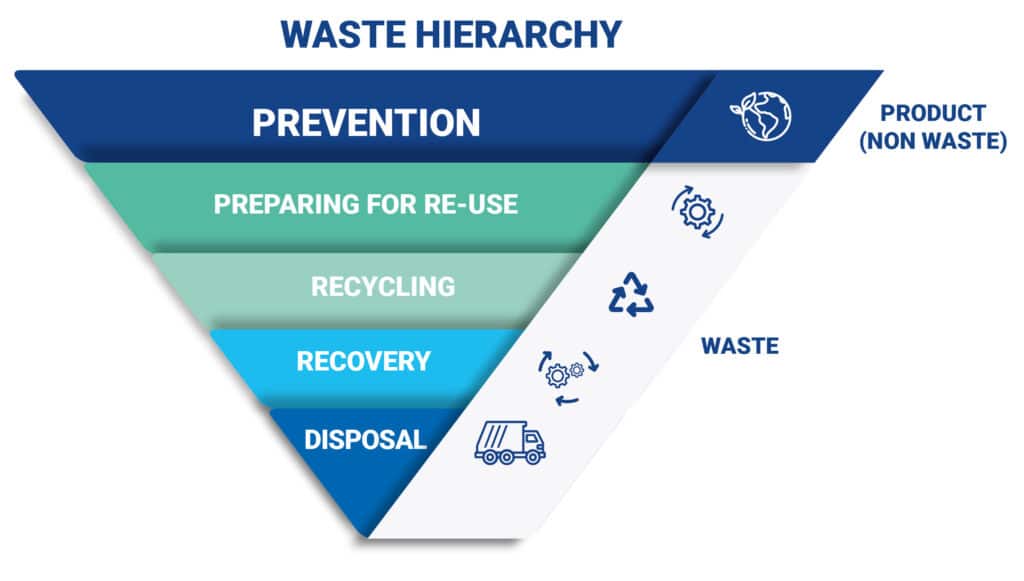

EUROPE
What is the EU Waste Framework Directive?
By John Dillon, VP Marketing Superfy, 12 April 2023

What is the EU Waste Framework Directive?
A Guide for Waste and Recycling Management Companies and Governments
Waste management and recycling are critical areas for addressing environmental challenges and promoting sustainability. In the European Union (EU), the Waste Framework Directive plays a crucial role in guiding waste and recycling management companies and governments towards sustainable waste management practices. This directive sets out key targets and requirements aimed at reducing waste generation, promoting recycling and recovery, and minimizing environmental impacts.
The main aspects of the directive are covered below.
Waste Hierarchy and Prevention
The Waste Framework Directive emphasizes the waste hierarchy, which prioritizes waste prevention as the top priority, followed by preparation for reuse, recycling, other forms of recovery, and disposal as a last resort. Waste and recycling management companies and governments need to align their practices with this hierarchy by focusing on waste prevention measures, such as promoting sustainable production and consumption patterns, reducing unnecessary packaging, and encouraging product reuse. Governments can support waste and recycling management companies by implementing policies that incentivize waste prevention efforts, such as promoting circular economy models and providing support for research and development of waste reduction technologies.

Recycling and Recovery Targets
The Waste Framework Directive sets ambitious targets for recycling and recovery of waste. By 2025, member states are required to achieve a minimum recycling and recovery rate of 55% of municipal solid waste (MSW) by weight with additional increases to 60% and 65% by 2030 and 2035 respectively. Waste and recycling management companies need to invest in infrastructure, technology, and operational practices to increase recycling and recovery rates. This may include setting up efficient collection and sorting systems, implementing effective recycling processes, and developing markets for recycled materials. Governments can support these efforts by providing funding, grants, and incentives to waste and recycling management companies to improve recycling infrastructure and invest in innovative recycling technologies.
End-of-Waste Criteria
The Waste Framework Directive also includes criteria that allow certain waste streams to be considered as “recovered materials” rather than waste if they meet specific quality standards. This can facilitate the use of recovered materials as secondary raw materials in the production of new products, reducing the dependence on virgin resources. Waste and recycling management companies need to ensure that their recovered materials meet these criteria to benefit from reduced regulatory requirements and enable their use as valuable resources. Governments can support the development of markets for recovered materials by creating a favourable policy environment, promoting public procurement of recycled products, and supporting research and innovation in the field of waste-to-resource technologies.
Extended Producer Responsibility (EPR)
The Waste Framework Directive promotes the implementation of EPR schemes, which hold producers responsible for the environmental impacts of their products throughout their lifecycle, including financing the costs of collection, treatment, and disposal at end-of-life. Waste and recycling management companies can play a critical role in the implementation and operation of EPR schemes, such as collection and treatment of products covered under EPR, and collaborating with producers to ensure compliance with EPR obligations. Governments can support the effective implementation of EPR schemes by providing guidance, monitoring compliance, and enforcing penalties for non-compliance.
Hazardous Waste Management
The Waste Framework Directive includes specific provisions for the management of hazardous waste, including stricter controls on the collection, transport, and treatment of hazardous waste. Waste and recycling management companies need to comply with these regulations to ensure proper handling, storage, transportation, and disposal of hazardous waste in accordance with the directive. Governments need to ensure that adequate regulations and infrastructure are in place to manage hazardous waste effectively and protect human health and the environment.
Conclusion
Overall, the key objective of the Waste Framework Directive is to promote sustainable waste management practices, minimize waste generation, and drive the transition towards a circular economy in the European Union.
At Superfy, we are aligned with this objective as we aim to support waste and recycling management organizations to scale their businesses efficiently in support of a circular economy.